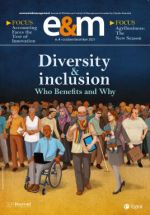Appunti del direttore
“Smart Working”: I’d Like to, but Can’t?
Every year, the Diversity, Inclusion & Smart Working (DIS) Observatory of the Sda Bocconi conducts research aiming at analyzing the way organizations conceptualize, implement, and promote “smart working,” highlighting the costs and benefits perceived by the workers and the organization itself. These studies have shown that the practice is still not very widespread, although it’s growing. The companies that adopt it are attentive to the issues of diversity management – at least formally – but their adoption of the practice is often conditioned by a series of restrictions that stiffen and distort the instrument. The goals of adopting smart working practices are often vague, while evaluation and monitoring is almost entirely absent. This shows that, with some exceptions, the actions are rhetorical, although they do require considerable effort to implement. The fact is that the organizational context is not ready to welcome this instrument that supplements traditional work methods. This year again, the DIS Observatory has further studied the issue, on the one hand concentrating on the way the scientific community has developed the subject; and on the other, on the way the public discussion has been constructed in the leading Italian newspapers.
An analysis of the literature shows that managerial studies have not yet dealt with the question systematically. The smart working label is almost absent in academic and scientific publications. The subjects closest to smart working regard so-called “Flexible Work Arrangements” or “Flexible Work Practices.” The first articles in this field date back to the mid-1980s, and start with the need to identify organizational methods that allow, on the one hand, the balancing of private life and work, and on the other, the development of solutions that to simplify, we could define as post-Fordist. Many of the articles are reviews of the literature; some have an empirical content whose results are still limited and partial. Therefore, smart working is something spoken of in organizations, consulting companies, and meetings for practitioners, but it is not yet supported by academic and scientific studies.
The analysis performed on the press (the newspapers Il Sole 24 ore, Il Corriere della Sera, and La Repubblica) shows that the process of institutionalization of the issue at the media level is underway, especially since 2017 (the year in which the Agile Work Law was discussed and approved), although some semantic uncertainty remains in the way the practice is designated.
The press takes a favorable view of smart working, stressing above all the benefits in terms of balancing private life and work. Other related themes are the role of technology, environmental sustainability, and an increase in “co-working” spaces. Here we see “the good side” of smart working, considered a practice that breaks with the past, is progressive, innovative, and oriented towards the future. Another benefit stressed is the increase of productivity generated by the introduction of smart working, that in certain cases, would be used as an instrument of rationalization and streamlining. Along with the theme of productivity, there is the question of the leadership model on which this practice is based; a model based on results orientation, trust, autonomy, and the responsibility of the associate.
While these benefits are presented as a source of emancipation of the worker, on the other hand, some critical questions emerge around the issue: the erosion of free time as time for oneself; the potential dilution of the work experience; the individualization and technologization of relationships; and the disruption of the bonds of values and identity between the members of an organization. Those points remain marginal and little discussed in the articles, thus giving the image of press organs that are not particularly critical and reflective.
(Zenia Simonella is a Fellow in Leadership, Organization & Human Resources at SDA Bocconi School of Management.)




